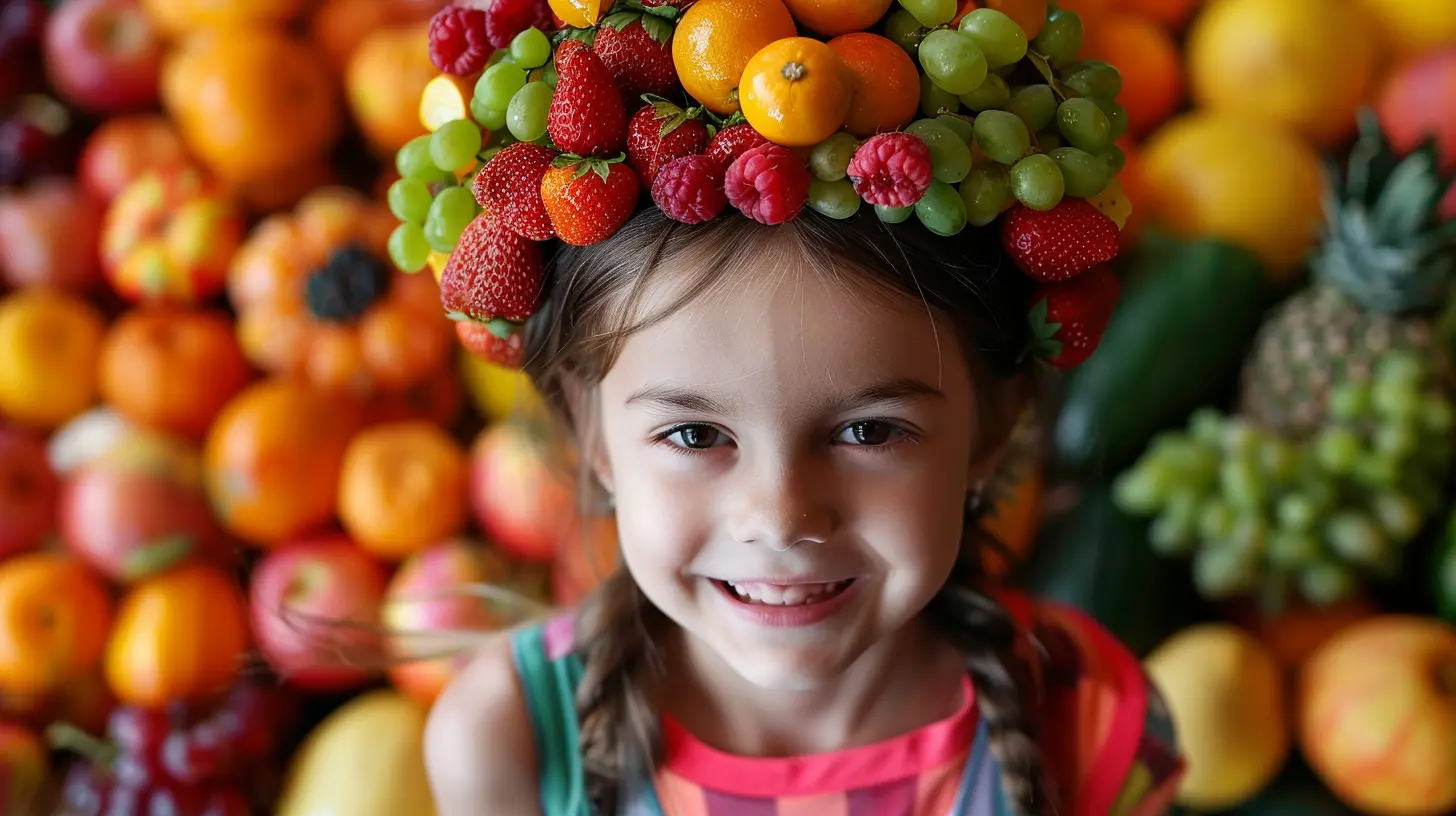The Link Between Nutrition and Cognitive Development in Children
17 November 2025
As parents, we all want the best for our kids. We carefully choose their schools, ensure they get enough sleep, and encourage them to read. But have you ever stopped to think about how the food they eat impacts their brain development?
Nutrition plays a massive role in shaping a child's cognitive abilities. From memory and attention span to problem-solving skills and emotional regulation, what kids consume directly affects how their brains grow and function.
So, let’s dive into the fascinating link between nutrition and cognitive development in children.

How Nutrition Shapes Brain Development
The Brain’s Growth in Early Years
A child’s brain develops at an astonishing rate, especially in the first few years of life. In fact, by age three, the brain has already reached about 80% of its adult size! That’s a lot of development happening in a short period.During this time, neurons (brain cells) are forming connections like crazy. These connections shape how a child learns, thinks, and interacts with the world. But here’s the catch—this process depends heavily on the nutrients they receive.
Essential Nutrients for Cognitive Development
Certain nutrients are like fuel for the brain—they help it build and function at its best. Without them, kids may struggle with concentration, memory, and even emotional stability.Let’s break down some of the key nutrients essential for cognitive development:
1. Omega-3 Fatty Acids – The Brain’s Superfuel
Omega-3s, particularly DHA (docosahexaenoic acid), are crucial for brain development. They make up a large part of brain cell membranes, allowing neurons to communicate effectively.Studies have shown that children who consume enough omega-3s tend to have better memory, focus, and problem-solving skills. Foods rich in omega-3s include:
- Fatty fish like salmon, sardines, and mackerel
- Walnuts and flaxseeds
- Chia seeds
- Fish oil supplements (if needed)
If your child is a picky eater and refuses fish, sneak in some ground flaxseeds or chia seeds in smoothies or oatmeal!
2. Iron – Powering Brain Function
Iron is like a delivery truck for oxygen in the body—and the brain needs plenty of it to function properly. Low iron levels can result in decreased attention span, memory issues, and even developmental delays.Great sources of iron include:
- Lean meats (beef, turkey, and chicken)
- Spinach and other leafy greens
- Lentils and beans
- Fortified cereals
Pairing iron-rich foods with vitamin C (like oranges or bell peppers) increases absorption. So, that spinach salad with a squeeze of lemon? A total win!
3. Protein – The Building Blocks of Brain Cells
Protein isn't just for muscle growth—it plays a vital role in neurotransmitter production, which helps brain cells communicate. A lack of protein can lead to sluggish thinking and difficulty concentrating.Protein-rich foods include:
- Eggs
- Dairy products (milk, cheese, and yogurt)
- Lean meats and fish
- Nuts and seeds
- Beans and legumes
A quick and healthy breakfast packed with protein, like scrambled eggs with whole-grain toast, can set the tone for a productive day at school!
4. B Vitamins – The Brain’s Energy Boosters
B vitamins, particularly B6, B12, and folate, help in the production of neurotransmitters like serotonin and dopamine. These chemicals influence mood, memory, and cognitive function.To boost B vitamins, include:
- Whole grains (brown rice, quinoa, and oats)
- Leafy greens
- Dairy products
- Eggs
- Nuts and seeds
A balanced diet rich in B vitamins can help children stay alert and engaged throughout the day.
5. Antioxidants – Fighting Brain Stress
Just like our skin, the brain experiences wear and tear from stress and toxins. Antioxidants, found in colorful fruits and vegetables, protect brain cells from damage and support memory and learning.Foods high in antioxidants include:
- Blueberries, strawberries, and oranges
- Dark leafy greens like kale and spinach
- Nuts like almonds and walnuts
- Dark chocolate (Yes! In moderation, of course.)
A handful of berries as a snack? Not only delicious but also a brain-boosting powerhouse! 
The Impact of Poor Nutrition on Cognitive Development
Now that we know what helps, let’s talk about what harms. Poor nutrition doesn’t just affect physical health—it can have serious consequences on brain function, too.The Dangers of Processed Foods and Sugar
Junk food may be convenient, but it’s one of the worst things for a child’s brain. Processed foods loaded with artificial additives, refined sugars, and unhealthy fats can lead to:- Reduced attention span: High sugar intake causes energy spikes followed by crashes, leading to difficulty focusing in school.
- Slower cognitive processing: Lack of essential nutrients can slow brain function and learning ability.
- Mood swings and hyperactivity: Chemicals in processed foods can affect a child’s emotional regulation.
A diet full of processed snacks and sugary drinks may make kids feel sluggish and unfocused. Swapping chips for air-popped popcorn or swapping soda for infused water can make a big difference!
Malnutrition and Learning Difficulties
Children who don’t receive enough nutrients may experience developmental delays and learning difficulties. Studies have shown that malnutrition in early childhood can lead to lower IQ levels and academic struggles later in life.Skipping breakfast or consistently eating nutrient-poor meals can set children up for poor cognitive performance. A well-balanced diet fuels their brain for learning and problem-solving. 
Practical Tips for Parents
So, how can you make sure your child gets the nutrition they need for optimal brain development? Here are some simple, actionable tips:1. Start the Day with a Nutrient-Packed Breakfast
Breakfast is the most important meal of the day—especially for growing minds! A breakfast rich in protein, healthy fats, and fiber can keep kids mentally sharp.Try options like:
- Greek yogurt with berries and granola
- Scrambled eggs with whole wheat toast
- Oatmeal topped with nuts and banana
2. Balance Every Meal
Aim to include a mix of proteins, healthy fats, and complex carbohydrates in every meal. This ensures steady energy levels and brain function throughout the day.3. Encourage Hydration
Dehydration can lead to poor concentration and fatigue. Make water the go-to drink instead of sugary juices or sodas. If plain water is too boring, infuse it with lemon, mint, or berries.4. Limit Processed and Sugary Foods
Try to reduce processed snacks and replace them with whole, natural foods. Instead of chips, offer homemade trail mix with nuts and dried fruits.5. Get Kids Involved in Meal Prep
Kids are more likely to eat healthy foods if they help prepare them. Let them pick out colorful vegetables at the grocery store or help stir ingredients in the kitchen.6. Lead by Example
Children mimic what they see. If they see you eating balanced meals, they’re more likely to do the same. Make mealtime a positive, family-focused experience!
Final Thoughts
The food our children eat doesn’t just fill their stomachs—it fuels their brains. A well-balanced diet rich in essential nutrients lays the foundation for better concentration, enhanced memory, and overall cognitive development.By making small but intentional changes to their diet, you can help set your child up for lifelong success—not just academically, but in every aspect of their life.
So, the next time you’re preparing a meal for your little one, remember: You’re not just feeding their body, you’re nourishing their mind.
all images in this post were generated using AI tools
Category:
Pediatric HealthAuthor:

Arthur McKeever
Discussion
rate this article
1 comments
Kassandra Jones
Great insights! Healthy eating truly shapes little minds—what they eat today, they’ll think tomorrow!
November 21, 2025 at 4:56 AM

Arthur McKeever
Thank you! I completely agree—nutrition plays a vital role in shaping both physical health and cognitive development in children.


